|
|
|
Sort Order |
|
|
|
Items / Page
|
|
|
|
|
|
|
| Srl | Item |
| 1 |
ID:
167988
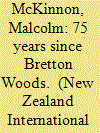

|
|
|
|
|
| Summary/Abstract |
Malcolm McKinnon reflects on changes in the global monetary and financial system, and New Zealand’s place in it, since the ground-breaking Bretton Woods conference of July 1944.
|
|
|
|
|
|
|
|
|
|
|
|
|
|
|
|
| 2 |
ID:
133849
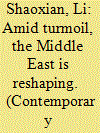

|
|
|
|
|
| Publication |
2014.
|
| Summary/Abstract |
Turmoil in Iraq reached a new level when ISIL seized Mosul after the Iraq security force collapsed on June 10. Although ISIL, the Islamic State in Iraq and the Levant , look after over Fallujah in early 2014, this latest development has deeper repercussions. On June 29, ISIL declared a large territory between Iraq and Syria a new state.
|
|
|
|
|
|
|
|
|
|
|
|
|
|
|
|
| 3 |
ID:
133563
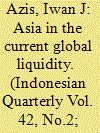

|
|
|
|
|
| Publication |
2014.
|
| Summary/Abstract |
In contrast with the pre~1997/98, today's emerging Asia registers excess savings. Since early 2000s, the liquidity was further boosted by in?ows of capital including those going through the banking sector. After a brief, yet sharp, interruption at the beginning of the global ?nancial crisis, in?ows resumed albeit of different form and inducted by different agents. Nonetheless, the global liquidity sphere has clearly changed. When the quantitative easing tantrum began in May last year, volatility returned. Largely due to a lack of innovative policy response, the episode of vacillating flows produced repercussions not different than in the past because the incentive system remains unchanged. Consequendy, vulnerability still rises with capital ?ows. The 'rational' response of agents is equally predictable, raising the risk of financial instability and exacerbating the already widening income disparity. Nothing is fundamentally new, everyone continues to "dance with the system."
|
|
|
|
|
|
|
|
|
|
|
|
|
|
|
|
| 4 |
ID:
092145
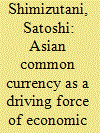

|
|
|
|
|
| Publication |
2009.
|
| Summary/Abstract |
This article proposes an open and multi-tiered economic and financial system with introduction of an Asian common currency as a form for the Post Bretton-Woods arrangement. After reviewing the role of the incumbent international economic system, the reasons that an Asian common currency could contribute to consolidate the new international system is discussed bearing in mind the new environment of the relative decline of economic power of the United States and relative rise of economic power of China. Then a "roadmap" for the introduction of an Asian common currency is provided and how to proceed steadily on the long road towards the introduction of the new currency is argued. In particular, it is emphasized, as the world looks for a new direction, that strong political collaboration in the region is required precisely now with a view to making this a reality.
|
|
|
|
|
|
|
|
|
|
|
|
|
|
|
|
| 5 |
ID:
127619
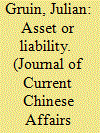

|
|
|
|
|
| Publication |
2013.
|
| Summary/Abstract |
China's financial system, dominated by the banking sector, has played a central role in the development of an imbalanced trajectory of economic development and growth. As one of the primary mechanisms for implementing decisive macro-economic policy, the banking sector has hitherto served the Chinese growth strategy well in actively allocating capital towards the investment and export sectors, whilst proving capable of managing the macro-economic ramifications of this highly inter-ventionist strategy. However, the role of the financial system in this growth strategy is also rooted in the requirement that authority over financial capital remains closely tied to state institutions and policies, due to elite concern over politico-economic instability. Based on policy analysis and qualitative interviews conducted in mid-2012, the article suggests that whilst the structure of the financial system was conducive to fostering the growth of the real economy, it will hold back not the need for rebalancing, but rather the process of rebalancing itself.
|
|
|
|
|
|
|
|
|
|
|
|
|
|
|
|
| 6 |
ID:
086028
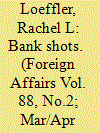

|
|
|
|
|
| Publication |
2009.
|
| Summary/Abstract |
Over the last five years, U.S. national security policy and the international banking system have become inextricably intertwined. With terrorism and nuclear proliferation at the top of the United States' foreign policy agenda and few diplomatic or military levers left to pull, Washington has increasingly turned to the private sector for help in confronting some of its biggest international challenges. That has meant, above all, an effort to work with banks to put pressure on states and other international actors that the United States otherwise has little ability to influence.
This effort is defined by a careful dance between the U.S. government and the global banking industry. Through targeted financial measures, Washington has signaled to banks situations in which it sees dangerous actors intersecting with the international financial system. Banks, for the most part, have acted on these signals, and the two most recent chapters in this unfolding story -- Iran and North Korea -- suggest that using global finance to shape the behavior of international actors can be remarkably powerful.
But financial measures are only as effective as the banks that implement them. Given the role that banks, rather than governments, now play as agents of international isolation, policymakers must develop a more sophisticated and accurate understanding of what this new tool of statecraft can and cannot do. In its bid to curb Iran's and North Korea's destabilizing efforts to develop or expand their nuclear programs, the U.S. government has, in recent years, financially targeted not only Tehran and Pyongyang but also the individuals, companies, and associations that front their illicit activities. These measures have depended on a diplomatic campaign aimed at the world's financial centers
|
|
|
|
|
|
|
|
|
|
|
|
|
|
|
|
| 7 |
ID:
132573
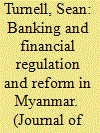

|
|
|
|
|
| Publication |
2014.
|
| Summary/Abstract |
For fifty years Myanmar has been without a properly functioning financial system. This absence has been a significant brake on the efficacy of reform in Myanmar, on foreign investment, and on the ability of Myanmar firms to raise the capital they need to grow and prosper. Since 2011, however, critical but limited reforms have been put in place by Myanmar's new government. These include reforms to Myanmar's exchange rate arrangements, and the granting of a degree of formal autonomy to the country's central bank. Other reforms, pending but not yet implemented, include allowing a role for foreign banks, and making changes to the broader regulatory arrangements that currently greatly constrain the operations of Myanmar's banks. In recent times much progress has been made in creating the financial institutions Myanmar needs to achieve transformational growth, but much remains to be done.
|
|
|
|
|
|
|
|
|
|
|
|
|
|
|
|
| 8 |
ID:
099432
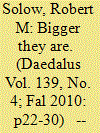

|
|
|
| 9 |
ID:
085633
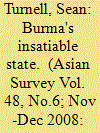

|
|
|
|
|
| Summary/Abstract |
The bounty presently accruing to Burma from rising exports of natural gas promises to transform the country's finances. Redeeming this promise, however, will require wholesale reform of Burma's fiscal and financial arrangements. Such reforms are unlikely. This article explores the financial potential of Burma's gas exports, the danger that they could yield a "resources curse," and the extent to which the state's fiscal demands compromise Burma's economic development.
|
|
|
|
|
|
|
|
|
|
|
|
|
|
|
|
| 10 |
ID:
115914


|
|
|
|
|
| Publication |
Washington DC, Institute For International Economics, 2004.
|
| Description |
xv,218p.
|
| Standard Number |
0881323705
|
|
|
|
|
|
|
|
|
|
|
|
Copies: C:1/I:0,R:0,Q:0
Circulation
| Accession# | Call# | Current Location | Status | Policy | Location |
| 056911 | 363.25968/REU 056911 | Main | On Shelf | General | |
|
|
|
|
| 11 |
ID:
117792


|
|
|
| 12 |
ID:
183235
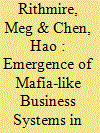

|
|
|
|
|
| Summary/Abstract |
A large body of literature on state–business relations in China has examined the political role of capitalists and collusion between the state and the private sector. This paper contributes to that literature and understanding of the internal differentiation among China's business elites by documenting the emergence of a particular kind of large, non-state business group that we argue is more akin to a mafia system than any standard definition of a firm. Drawing on large-N descriptive data as well as deep ethnographic and documentary research, we argue that mafia-like business systems share organizational principles (plunder and obfuscation) and means of growth and survival (relations of mutual endangerment and manipulation of the financial system). Understanding the particular moral economy that underlies mafia-like business systems and their interactions with the state challenges methodological foundations of research on China's political economy and helps to explain recent conflict between high-profile business people and the state.
|
|
|
|
|
|
|
|
|
|
|
|
|
|
|
|
| 13 |
ID:
094726
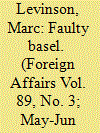

|
|
|
|
|
| Publication |
2010.
|
| Summary/Abstract |
Attempting to prevent future financial crises by drafting new global regulations will do more harm than good. If governments adopt the same regulations, they will make the same mistakes. Instead, financial regulation must be the task of individual governments and not multilateral committees.
|
|
|
|
|
|
|
|
|
|
|
|
|
|
|
|
| 14 |
ID:
125409
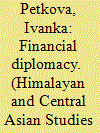

|
|
|
|
|
| Publication |
2013.
|
| Summary/Abstract |
China is the world's biggest exporter since 2009 and the second largest economy since 2010.after achieving these high levels of inclusion into the global economy and trade in could be expected for the national currency (the Chinese Yuan) to find international demand. However, the still developing financial system and the currency control regime are key obstacles for this demand to evolve.
|
|
|
|
|
|
|
|
|
|
|
|
|
|
|
|
| 15 |
ID:
135051
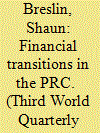

|
|
|
|
|
| Summary/Abstract |
The reappearance of substantial debt in China after 2008 has refocused attention on the sustainability of the existing financial ‘model’. It’s not just that ‘traditional’ forms of bank-centred debt have re-emerged, but that the informal ‘shadow banking’ sector also seems increasingly fragile, generating debts that do not seem easy to repay. Explanations for the current situation focus on the way in which China responded to the global financial crisis, and on the incentives that exist to go outside the formal and more regulated banking system into often riskier activities. But there are more fundamental structural issues. The current financial system contains within it some of the dna of its predecessor, while the spatial distribution of power and authority is inextricably linked to the way the financial system functions. While it might be possible to tinker with some elements of current financial problems, the relationship between local government financing, land, the banking system and key economic sectors makes it difficult to resolve more structural issues without taking a holistic approach; one that would have fundamental consequences for the nature of the Chinese state, and the distribution of power within it.
|
|
|
|
|
|
|
|
|
|
|
|
|
|
|
|
| 16 |
ID:
152167
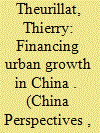

|
|
|
|
|
| Summary/Abstract |
Illustrated by a case study on the urban development of a medium-sized city in China, this article develops a theoretical framework to help understand the role the financial system plays in the urban development model based on land in China. Three fields of literature have been used in order to link the various mechanisms between land, urban infrastructure, property development, and financing channels in urban production. The case study illustrates the many interactions between local government and real estate businesses, both state and private, as well as local banks, in order to create urban infrastructure that responds to “communal and public” needs and real estate objectives of a “private and individual” nature. In doing so, it highlights the fundamental role of capital in urban production in China.
|
|
|
|
|
|
|
|
|
|
|
|
|
|
|
|
| 17 |
ID:
065216
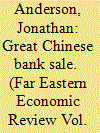

|
|
|
| 18 |
ID:
096252
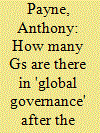

|
|
|
|
|
| Publication |
2010.
|
| Summary/Abstract |
The G20 summit has recently emerged as the dominant agency of global governance. It claims that its economic weight and broad membership give it a high degree of legitimacy and influence over the management of the global economy and financial system. But the G20 still excludes from membership some 150 other countries, all of which have interests at stake within the contours of contemporary global governance. In the financial arena these excluded countries contributed significantly to the alternative agenda for dealing with the global financial crisis proposed by the United Nations conference that met in June 2009. In the trade arena they engaged extensively in a variety of coalitions within the World Trade Organization during the so-called Doha Round and played a part in preventing a deal emerging that was unsatisfactory from their perspective. Questions are raised about the legitimacy of the G20 by the active presence of so many other country voices outside its remit and it can be expected that the excluded 'G150' will increasingly explore different ways to engage with the members of the G20 over the next few years.
|
|
|
|
|
|
|
|
|
|
|
|
|
|
|
|
| 19 |
ID:
177161


|
|
|
|
|
| Summary/Abstract |
In this paper, we use standard scenarios focussing on renewable energy, energy efficiency and grid investments. We take stock of the literature and quantitative data on available sources of financing for clean energy to qualitatively match supply and demand of specific sources of finance in the European context. Our analysis shows that under the current investment mandates and lending criteria the required funds for a successful energy transition are available. In fact, the current landscape of financing sources can provide between two and six times what is necessary. However, institutional investors and lenders such as pension funds and banks in particular are reluctant to invest in the renewable energy or grid infrastructure because of expected (policy) discontinuities. In addition, more venture capital and household investment are needed to finance low-risk small-ticket projects in the early stages of innovative clean energy technologies, to complement the abundantly available funds for large-scale investments. Based on our analysis, we develop a matrix indicating the role and availability of different sources of finance and new intermediation channels in the energy transition and how these should be deployed.
|
|
|
|
|
|
|
|
|
|
|
|
|
|
|
|
| 20 |
ID:
133267
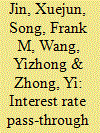

|
|
|
|
|
| Publication |
2014.
|
| Summary/Abstract |
Using the Phillips-Loretan approach, this paper verifies the degree and speed of pass-through and rigidity of different interest rates in China, as well as the response of private loan interest rates to other interest rates during 2002-2012. The results indicate that the long-term pass-through from the interbank offered rates and deposit and loan interest rates to the treasury bond rate is incomplete, but that the long-term pass-through to private loan interest rates is overshooting. The long-term pass-through from the deposit and loan interest rates to the overnight interbank offered rate is incomplete, while that to the interbank offered rates of other maturities is complete. The short-term pass-through and adjustment speed of interest rates exhibit asymmetry. Therefore, before considering a full liberalization of interest rates, it is important to further enhance the competition of the financial system and the function of different interest rate systems, such as the interbank market and bond market.
|
|
|
|
|
|
|
|
|
|
|
|
|
|
|
|
|
|
|
|
|